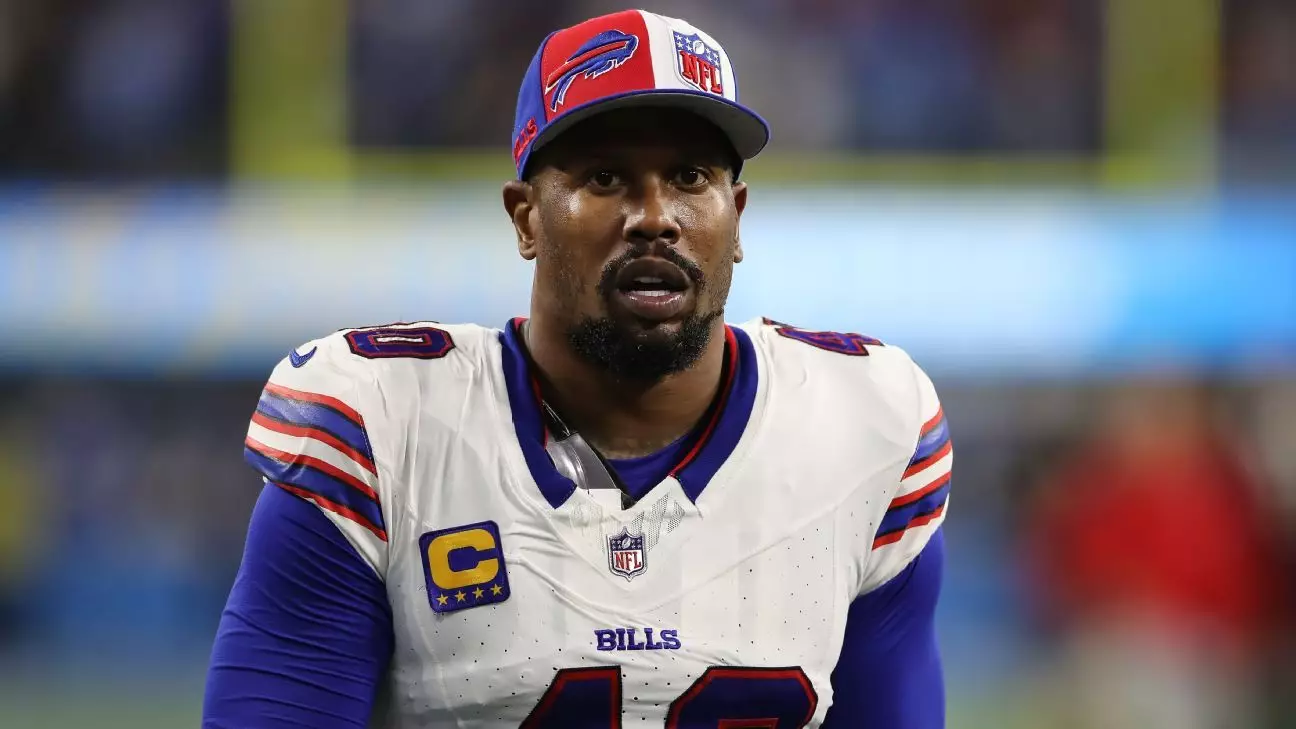In the fast-paced world of the NFL, news cycles can shift dramatically, especially when personal conduct issues intertwine with professional obligations. The recent suspension of Buffalo Bills defensive end Von Miller has not only affected his career but has also cast a long shadow over the league’s approach to player conduct and accountability. Miller, a high-profile player previously celebrated for his on-field achievements, now finds himself sidelined for four games due to violations of the NFL’s personal conduct policy, raising numerous questions about the nature of the accusations and their broader implications.
The suspension is a consequence of allegations dating back to November 2023, where Miller was accused of assaulting his pregnant girlfriend during the Bills’ bye week in suburban Dallas. Details emerged regarding an alleged incident that claimed Miller physically restrained the woman, which law enforcement later documented. While no charges were ultimately filed, the shadow of these allegations looms large, suggesting a nuanced landscape where personal actions impact professional reputations.
Miller’s experience illustrates a larger conversation about how personal conduct affects players’ careers in the high-stakes environment of the NFL. His interaction with the legal system — turning himself in following an arrest warrant — showcases his attempt to address the allegations directly but does not mitigate the consequences he faced professionally.
The absence of criminal charges against Miller does not absolve him from the NFL’s scrutiny. The league’s separate investigation into the allegations led to a four-game suspension, one that keeps Miller from significant matchups against teams like the Seattle Seahawks and the New York Jets. This decision underscores the NFL’s desire to maintain a standard of conduct that reflects its values, especially concerning player behavior off the field.
NFL Commissioner Roger Goodell’s deliberation against placing Miller on the exempt list indicates the delicate balance the league seeks to strike. While he acknowledged the gravity of the situation, he deemed that immediate action was unwarranted based on available information at the time. This inconsistent application of standards raises questions about the league’s handling of personal conduct violations. It sends a message: actions off the field must align with the NFL’s code of ethics, yet the guidelines seem to remain murky, leading to uncertainty among players and fans alike.
Miller has publicly denied the allegations, asserting that they are “100 percent false,” which highlights the often convoluted nature of such personal disputes. His claims of innocence resonate with those who know him as a player; however, the allegations themselves complicate the narrative. Miller’s insistence on the seriousness of domestic violence, coupled with his denial of the specific allegations, displays the multifaceted challenges that both he and the league face.
His comments reflect a concern that the gravity of domestic violence as an issue should not be taken lightly but rather regarded with the seriousness it deserves. This complexity showcases a tension where personal narratives must coexist with the overarching issues of accountability in sports, whereby the mere presence of allegations can create lasting reputational damage.
At 35 years old, Miller is at a critical juncture in his career. His prior achievements include a six-game suspension in 2013 for performance-enhancing drugs and a remarkable career as demonstrated through his current season’s performance. While he contributes notably to the Bills’ defensive line with critical plays, being off the field for four games will inevitably affect his momentum and rhythm as a player. The potential ramifications of this season extend beyond personal achievement and could impact his contract negotiations moving forward.
The Bills, having adjusted their roster by signing defensive tackle Zion Logue in place of Miller, are now navigating their own challenges without a key player. As the organization assesses its direction, how they respond to this incident may also set a precedent for how they handle player conduct moving forward.
The situation surrounding Von Miller serves as a reflective point for the NFL, its players, and its fans. It crystallizes the ongoing struggle to align personal behavior with professional expectations. As the league continues to grapple with these issues, the fallout from Miller’s suspension is not just about one player but is emblematic of broader societal issues that demand careful consideration and action. As this narrative unfolds, it will undoubtedly prompt further discussions regarding personal accountability, the delineation of league policy, and the profound impacts of individual actions on collective environments.


Leave a Reply